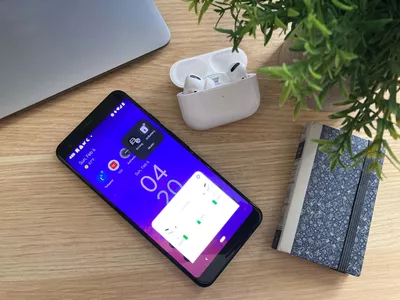
iCloud Separation How To Disconnect iPhone 14 and iPad

iCloud Separation: How To Disconnect Apple iPhone 14 and iPad
Managing your iCloud is important to maintain the security of your Apple devices. Your iCloud account is the central hub for your photos, documents, contacts, and more. It’s essential to ensure that your devices are safe and secure. However, there are scenarios when you might want to remove it.
The page below will guide you on how to disconnect your Apple iPhone 14 from iCloud. It highlights the benefits of having full control over your data. Below, you can learn how to disconnect from iCloud,keeping your data organized and secure. Explore the article to learn more.
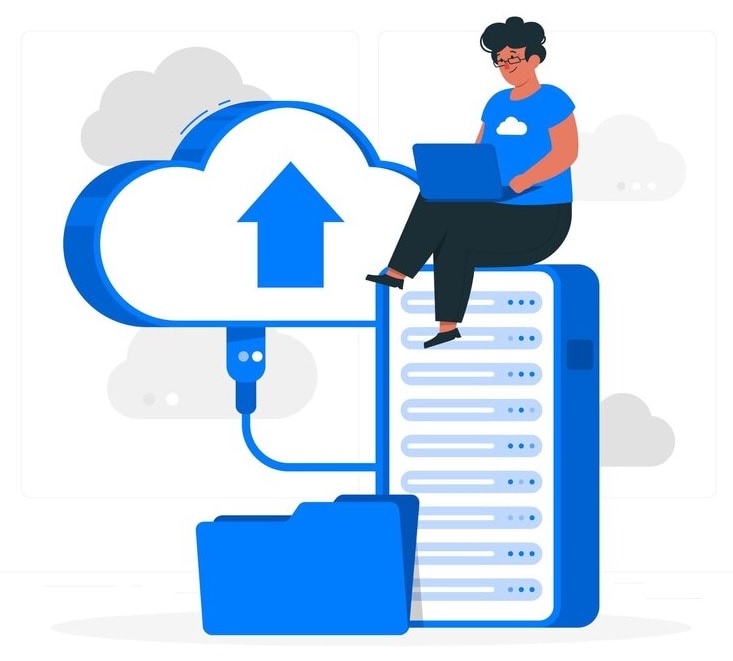
Part 1. Why Disconnect From iCloud?
iCloud is one of the most integral parts of the Apple ecosystem. It syncs your data across devices and ensures a connected digital experience. Yet, there are times when disconnecting from iCloud is necessary. Below are some specific reasons why you should learn how to disconnect your iPad/iPhone from iCloud.
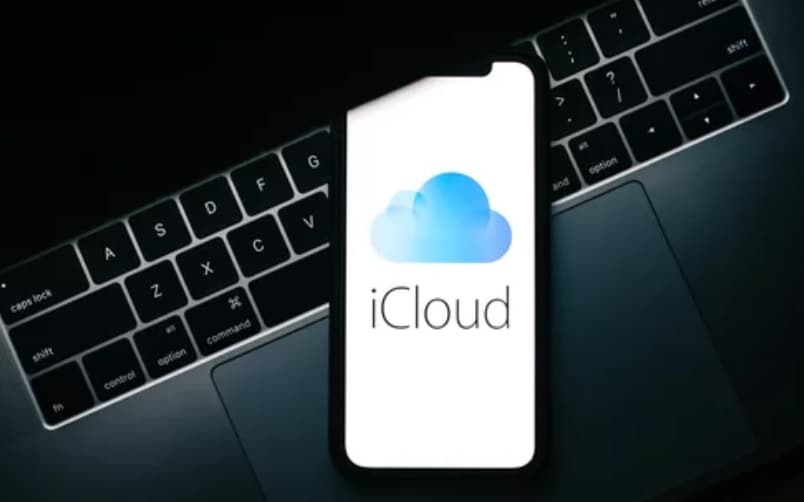
Privacy Concerns
Privacy is an important concern in today’s digital age. Disconnecting from iCloud can provide a layer of security. It prevents sensitive information like photos, contacts, and documents from being stored in the cloud. This is important if you prefer to maintain complete control over your data.
Selling or Giving Away Your Device
When you decide to sell or give away your Apple iPhone 14 or iPad, it’s essential to disconnect it from iCloud. Failing to do so could allow the new owner access to your data. Disconnecting ensures your device is wiped clean of your iCloud information, protecting your privacy.
Limited Storage Space
Apple offers a limited amount of free iCloud storage. If you’ve reached or exceeded your storage quota, disconnecting certain devices can help free up space. It can also prevent annoying notifications about running out of storage and keep your backups and documents accessible.
Changing Apple ID
If you decide to change your Apple ID for any reason, disconnecting from iCloud is necessary. This operation allows you to reconnect your old ID to a new one if necessary. It ensures that all purchases, app downloads, and data are linked to the new ID.
The benefits of disconnecting from iCloud include enhanced security and privacy. Disconnecting your iCloud account can also lead to reduced usage. It’s great for users who want more control over their data or prefer to keep their devices offline.
Part 2. Disconnect iPhone/iPad From iCloud Through 6 Manners
Learning how to disconnect aniPhone or iPad from iCloudcan be necessary for various reasons. To guide you through the process, here are six methods to do so.
Use Settings To Access iCloud
- Step 1: Open the Settings app on your Apple iPhone 14/iPad. Next, tap your name at the top, where your Apple ID is listed.
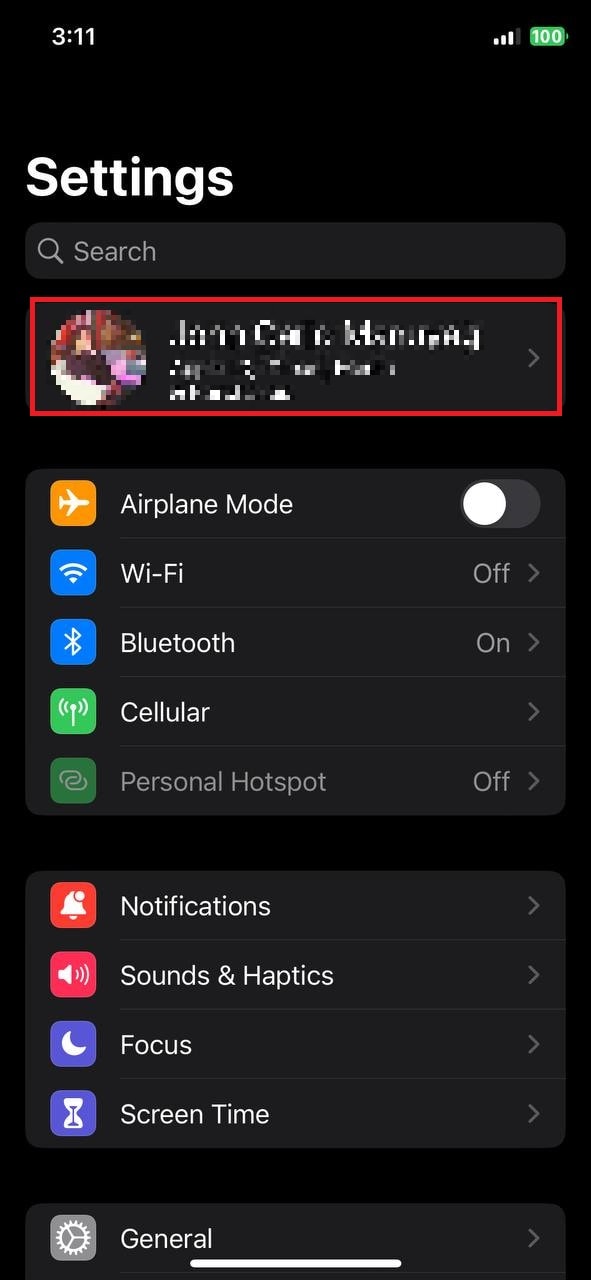
- Step 2: Scroll down and tap Sign Out. When prompted, type in your Apple ID and password. Next, choose TurnOff for the data you want to keep on your device. Afterwards, your Apple iPhone 14 or iPad is now disconnected from iCloud.
Visit iCloud.com
You can also remove your iCloud account on your Apple iPhone 14/iPad by visiting the iCloud.com website. Here’s how.
- Step 1: Launch a web browser on your computer or another device. Visit iCloud.com and sign in with your Apple ID.
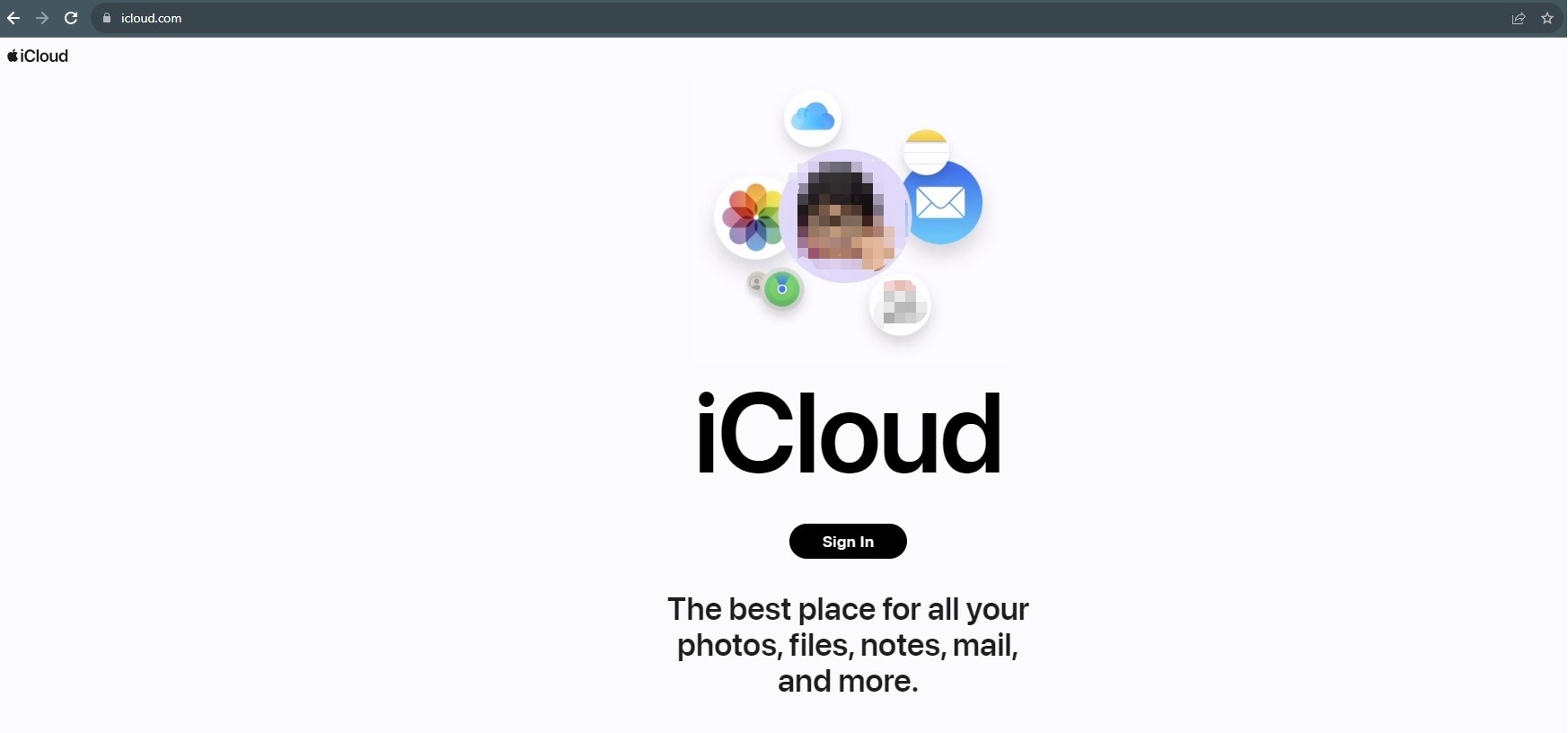
- Step 2: Click AccountSettingsin the interface and scroll down. Choose the option to Sign Out of All Browsers. Next, confirm your choice to disconnect your iCloud from your Apple iPhone 14 or iPad.
Factory Reset
Performing a factory reset can cause all data on your device erased, effectively disconnecting it from iCloud. Here’s how.
- Step 1:Go to your device’s Settings. Next, tap on General> Reset. ChooseErase All Content and Settings.
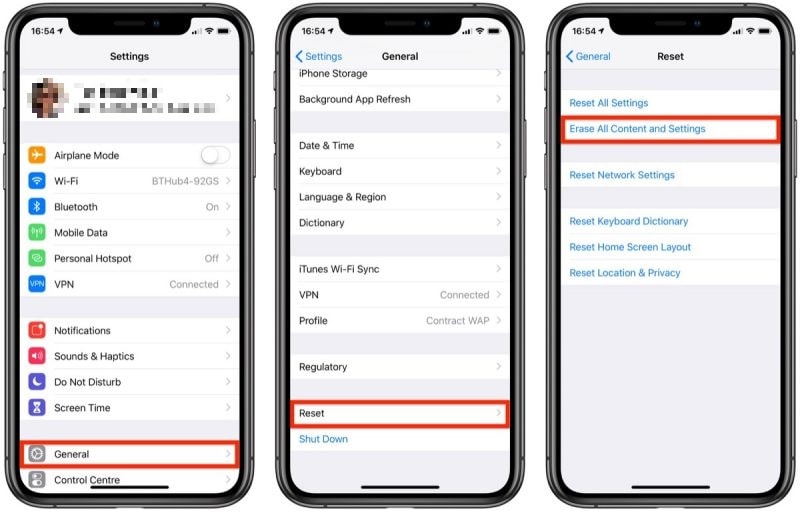
- Step 2: You’ll be prompted to enter your passcode and Apple ID password. Enter your details and confirm the reset.
Note
Be cautious with this method, as it will erase all data on your device.
Use the Find My App (iOS 13 and later)
You can use the Find My app to remove an iCloud account from a specific device. Here are the steps below.
- Step 1: Open the Find Myapp on your device. Next, tap the Devicestab at the bottom.
- Step 2: Select the Apple iPhone 14 device you want to disconnect. Afterwards, tap Remove This Device. Once you confirm your choice, it will disconnect the Apple iPhone 14 device from an iCloud account.
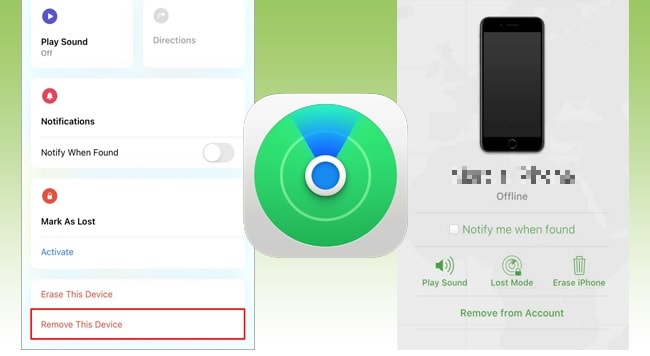
Contact Apple Support
If you encounter issues disconnecting your device from iCloud, contacting Apple support is a wise choice. It’s a good option if you have difficulties using the previous methods. They can guide you through the process and offer personalized assistance.
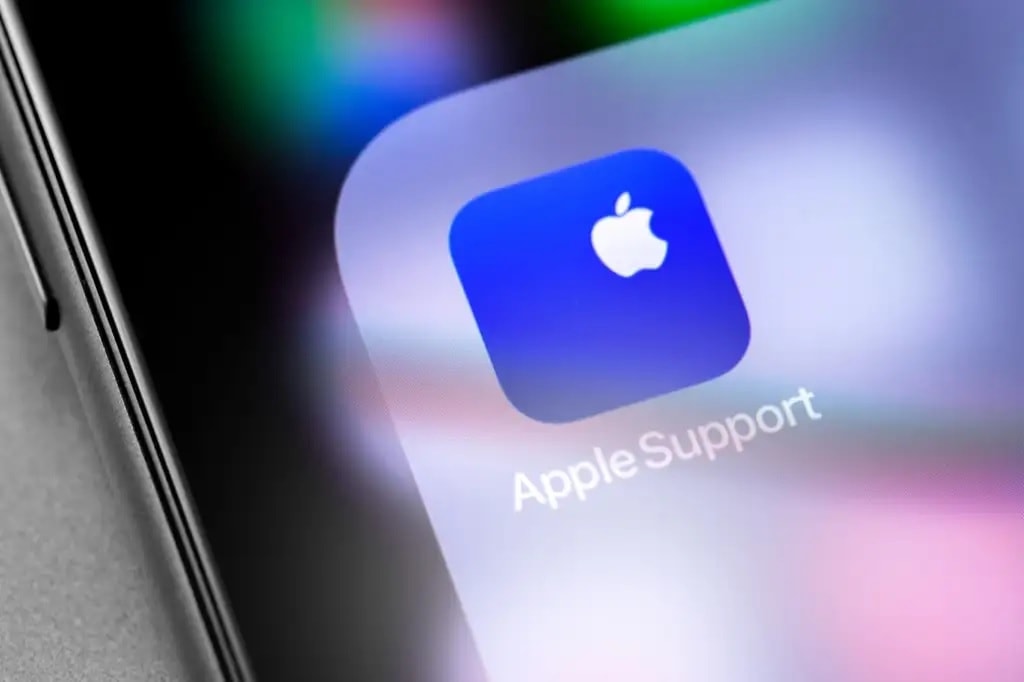
Use a Third-Party Tool
If you’ve tried all the options and even contacted Apple support but still face persistent issues, it might indicate more serious problems. If it detects unusual activity, your Apple iPhone 14 or iPad might trigger iCloud’s Activation Lock. A trusted third-party tool like Wondershare Dr.Fone- Screen Unlock can work wonders in such cases.
Part 3. Steps To Remove iCloud From iPhone/iPad With a Flexible Alternative-Wondershare Dr.Fone
Dr.Fone is a flexible alternative tool that can remove iCloud from your Apple iPhone 14 or iPad. Your Apple iPhone 14 or iPad will most likely trigger iCloud’s Activation Lock if all the steps above do not solve your issue. In that case, Dr.Fone - Screen Unlock can help you bypass it, allowing you to regain control of your device. The steps below show you how to disconnect from iCloudin 3 simple steps.
- Step 1: Start by downloading and installing Dr.Fone on your computer. Once installed, launch the program. Click Toolbox> ScreenUnlock> iOSto move on to the next process.

- Step 2: On the next window, select iCloud Activation Lock Removal to initiate the process. Next, connect your Apple iPhone 14/iPad to the computer with a USB cable. Wait for Dr.Fone to recognize your device, and it will lead to the next screen.
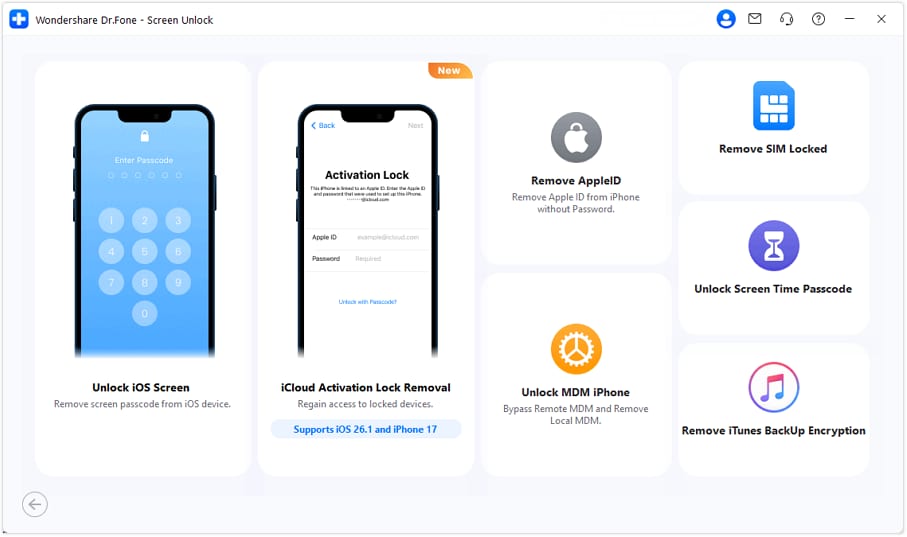
- Step 3: Follow the next on-screen instructions. Afterwards, Dr.Fone will automatically remove the ActivationLockdisplayed under the progress bar.
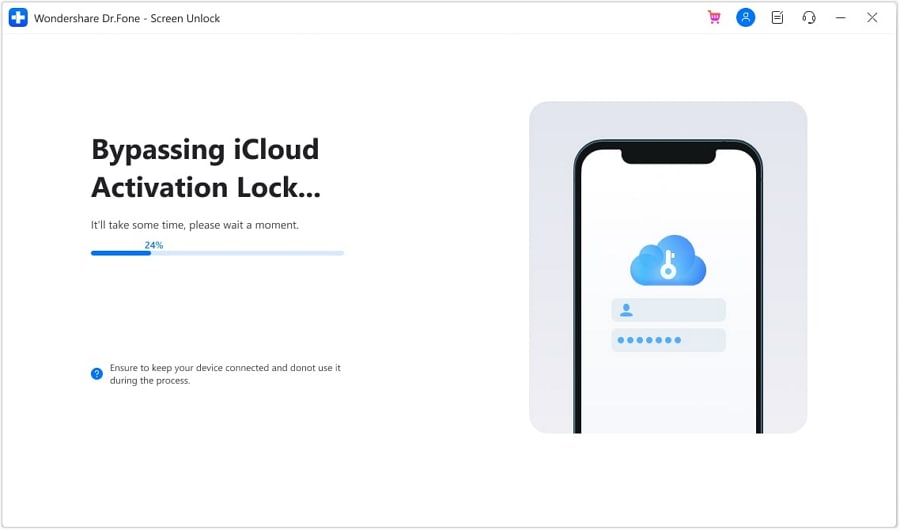
Once the process is completed, you should see the completion message below. Select Done to finish the removal of the iCloud Activation Lock on your Apple iPhone 14 or iPad. A successful process will automatically remove the iCloud on your device.
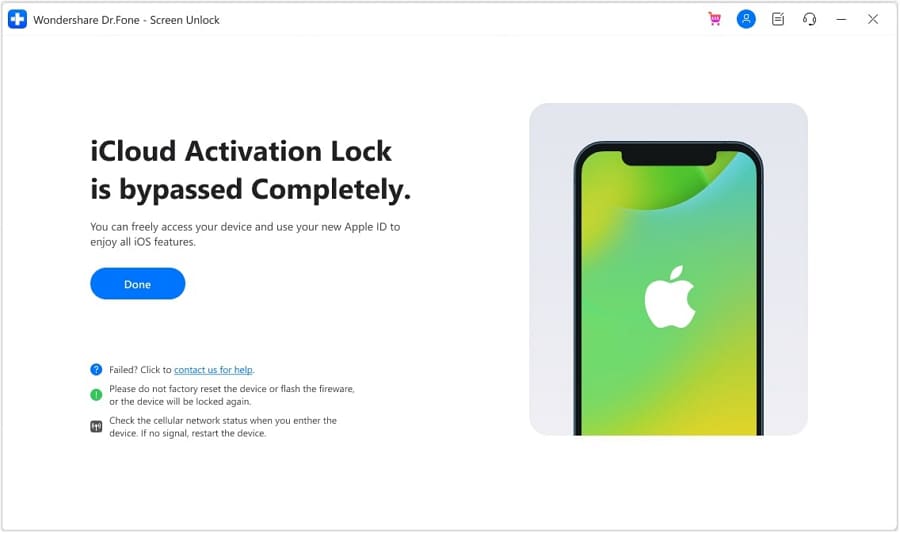
Part 4. How Dr.Fone Can Benefit You in Other Aspect
Dr.Fone goes beyond bypassing the iCloud activation lock. It offers a wide range of essential features that can enhance your device management and data recovery capabilities. Below are some key features that make Wondershare Dr.Fone a reliable tool.
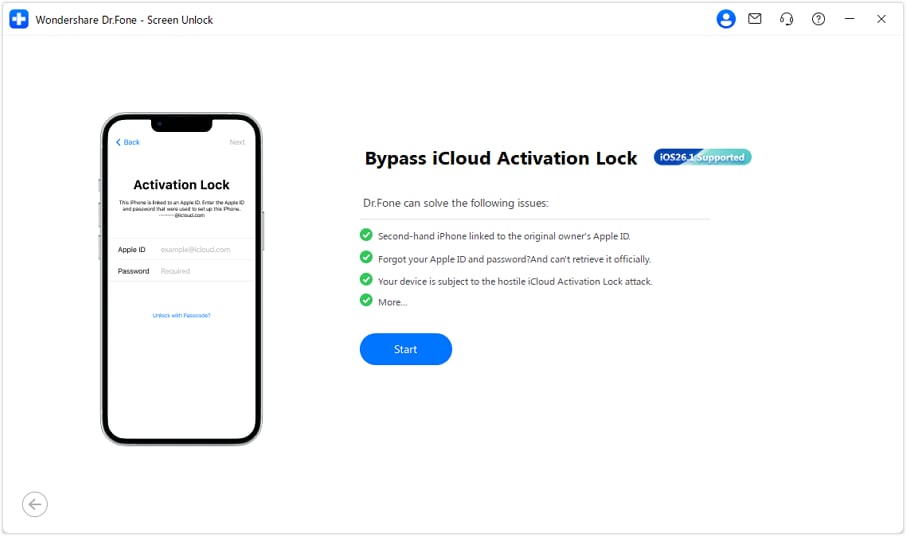
- Unlock Apple ID without a Password. Dr.Fone allows you to unlock your Apple ID without needing a password. The feature is helpful if you’ve been locked out of your account or face authentication issues.
- **Remove SIM Lock/Phone Carrier.**The tool can also remove SIM locks and phone carrier restrictions. This feature allows you to use your device with any carrier or SIM card.
- **No Data Loss.**A crucial advantage of Dr.Fone is its ability to perform all these operations without causing data loss. Your precious data, apps, and settings remain intact throughout the process.
Apart from its iCloud-related capabilities, Dr.Fone offers a comprehensive set of tools for managing your iOS device.
Data Recovery
Dr.Fone can help you recover lost or deleted data. Retrieve your messages, photos, videos, contacts, and more. The feature is a lifesaver when accidental data loss occurs.
Phone Manager
You can manage your device’s data directly on your computer. Transfer files and easily perform tasks like importing, exporting, or deleting content.
Phone Backup
Dr.Fone provides robust backup solutions. The platform allows you to create backups of your device and restore them when needed. It’s an essential part of maintaining the integrity of your data.
Conclusion
Managing your iCloud is essential for maintaining privacy and control over your Apple devices. The various methods on how to disconnect your Apple iPhone 14 from iCloudcater to different scenarios. Whether you disconnect using device settings or the flexibility of third-party tools like Dr.Fone, the choice is yours.
With these options at your disposal, you can tailor your data to meet your specific needs. Always remember that having a handy third-party tool like Dr.Fone can put your data worries at ease. It ensures you have another method of how to disconnect from iCloudfor any iCloud-related concerns.
Tips and Tricks for Apple ID Locked Issue On Apple iPhone 14
An Apple ID is a crucial gateway to Apple’s ecosystem. An Apple ID grants access to iCloud, the App Store, and more. However, the frustration of dealing with a disabled Apple ID can be overwhelming. The article below provides essential tips and tricks to unlock Apple ID successfully.
The page discusses common reasons for lockouts, steps to regain access, and proactive measures to prevent future issues. Don’t let your locked Apple ID stress you out. Follow the expert advice by exploring the article to resolve it. Enjoy uninterrupted access to your Apple services.
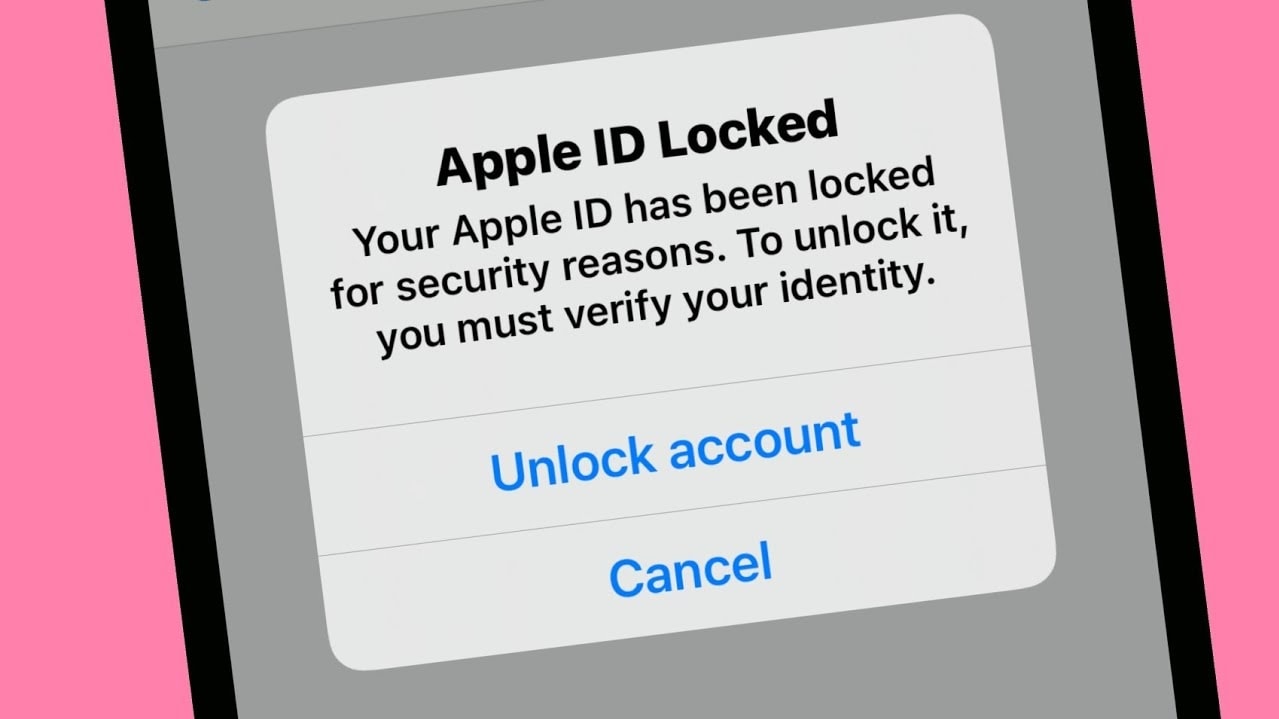
Part I. Common Reasons Why Apple ID Gets Disabled
Apple ID lockouts can be a frustrating experience. Understanding the reasons behind them can help you easily prevent and resolve these issues. Here are the most common causes of Apple ID disablement:
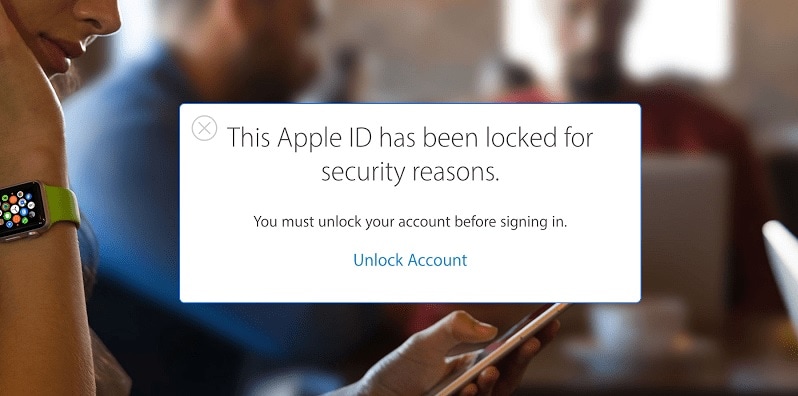
- Security Concerns: Apple takes security seriously. If Apple suspects unauthorized access to your account, they may deactivate it to protect your data.
- **Failed Login Attempts.**Repeated unsuccessful login attempts can trigger Apple’s security measures, whether by you or a potential attacker. It can result in your ID being disabled.
- **Payment Issues.**If there are problems with your payment method, Apple may disable your ID to prevent unpaid charges.
- **Violation of Apple’s Terms of Service.**Any breach of Apple’s terms and conditions can lead to your Apple ID being disabled. These include using unauthorized software or services.
- **Age Restriction Violations.**Apple may disable the account to comply with legal requirements. It triggers if a user under the age of 13 tries to create an Apple ID or access certain features.
- **Unusual Account Activity.**Suspicious activity, such as a sudden change in location, can result in an Apple ID lockout. It can also happen during unusual sale patterns or many login attempts from different locations.
Apple’s reputation for strong security measures is a significant reason for its popularity. The company uses robust encryption, 2-FA, and software updates to protect user data. Users trust Apple to safeguard their personal information. So, it’s essential to maintain a secure Apple ID to enjoy their services and have peace of mind.
Part II. 5 Basic Ways of Unlocking Your Apple ID
Unlocking your Apple ID is crucial to regain access to your valuable data. Here are five basic ways to unlock your Apple ID:
Contacting Apple’s Official Support
Contacting Apple’s official support is often the most reliable solution. Visit the Apple Support website or use the Apple Support app on your device. Apple’s support team can guide you through unlocking your Apple ID, ensuring it’s done right.
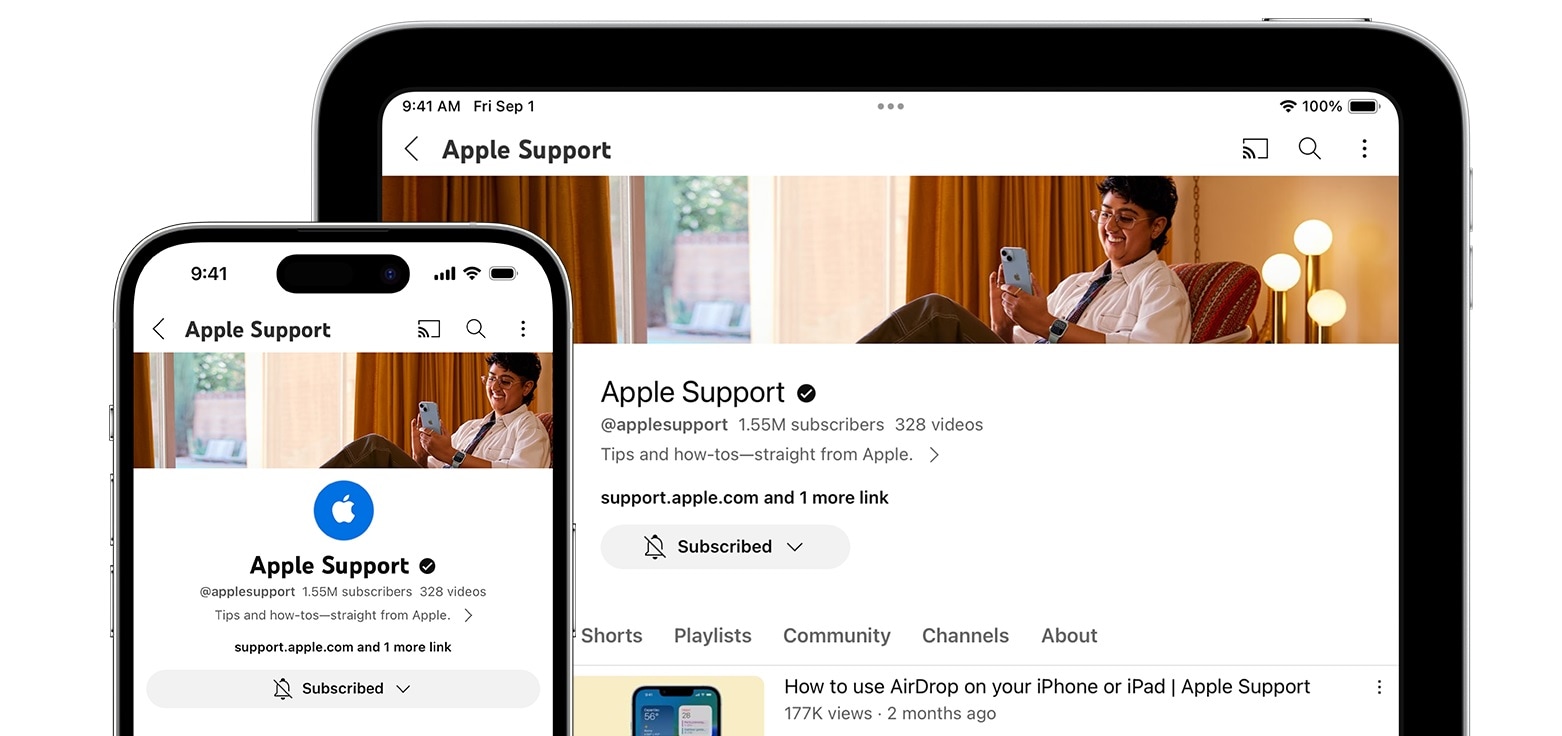
Account Recovery (iForgot)
Visit iforgot.apple.com, where you can initiate the account recovery process. Once on the website, you’ll have to enter your Apple ID. Next, you can choose how to reset your password or verify your identity through email. You can also answer security questions you’ve set up or verify through a trusted device.
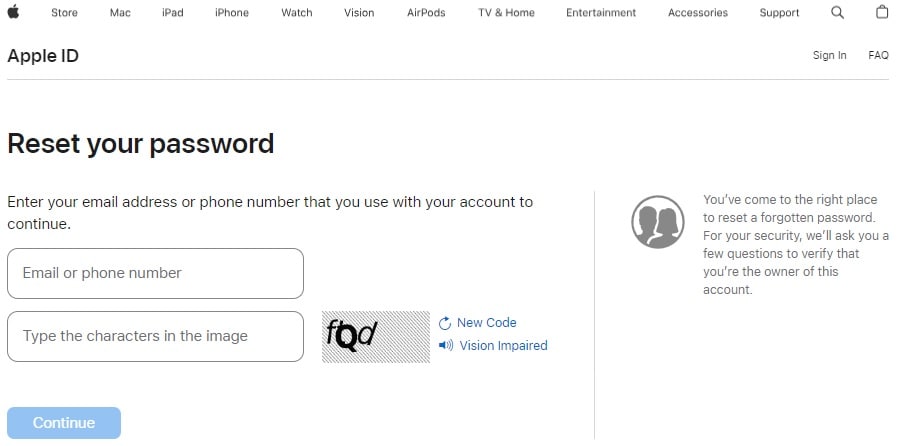
Two-Factor Authentication
If you have two-factor authentication enabled for your Apple ID, you can use your trusted device or the recovery key to unlock your account. Here’s how.
- Step 1: On your Apple iPhone 14, go to Settings. Next**,** tap on your name at the top. Tap Password & Security > Account Recovery > Recovery Key.
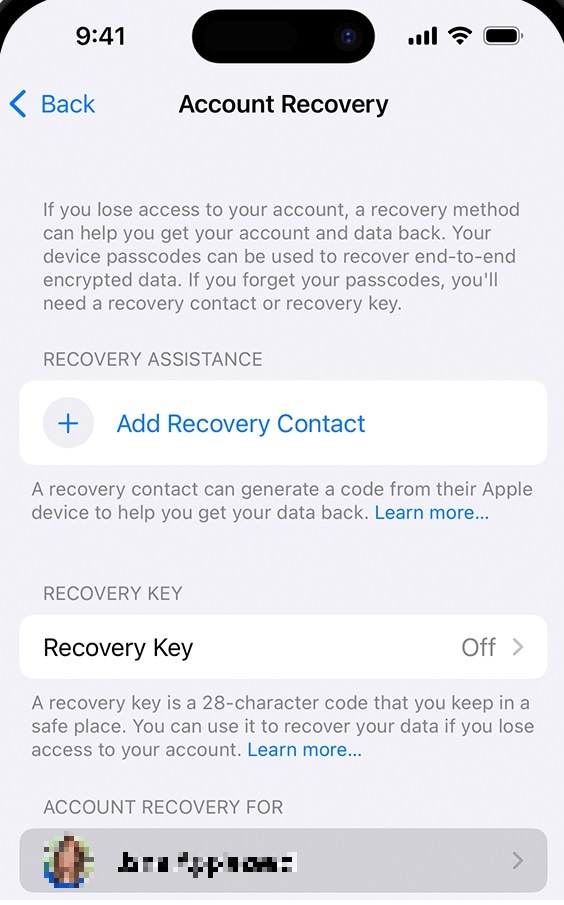
- Step 2: Turn on Recovery Key and enter your passcode. Write down your recovery key and confirm by entering it once more. You can now unlock your Apple ID with the recovery key generated.
Note
If you lose your recovery key, Apple cannot help you regain access anymore. It means that you will lose your account or data as the recovery key acts as the final security line to recover your account.
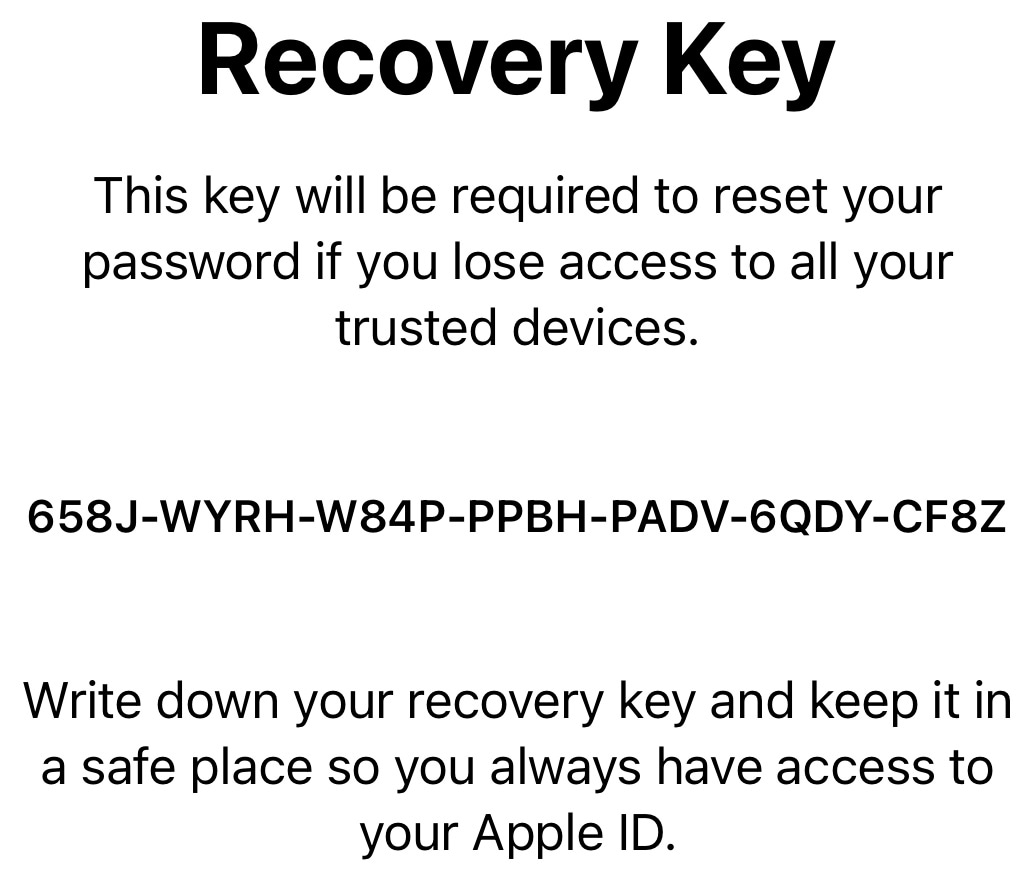
Reset Password
A simple solution to unlock your Apple ID is to reset your password. Here are the steps.
- Step 1: Go to Settings > Password & Security > Change Password on your device.
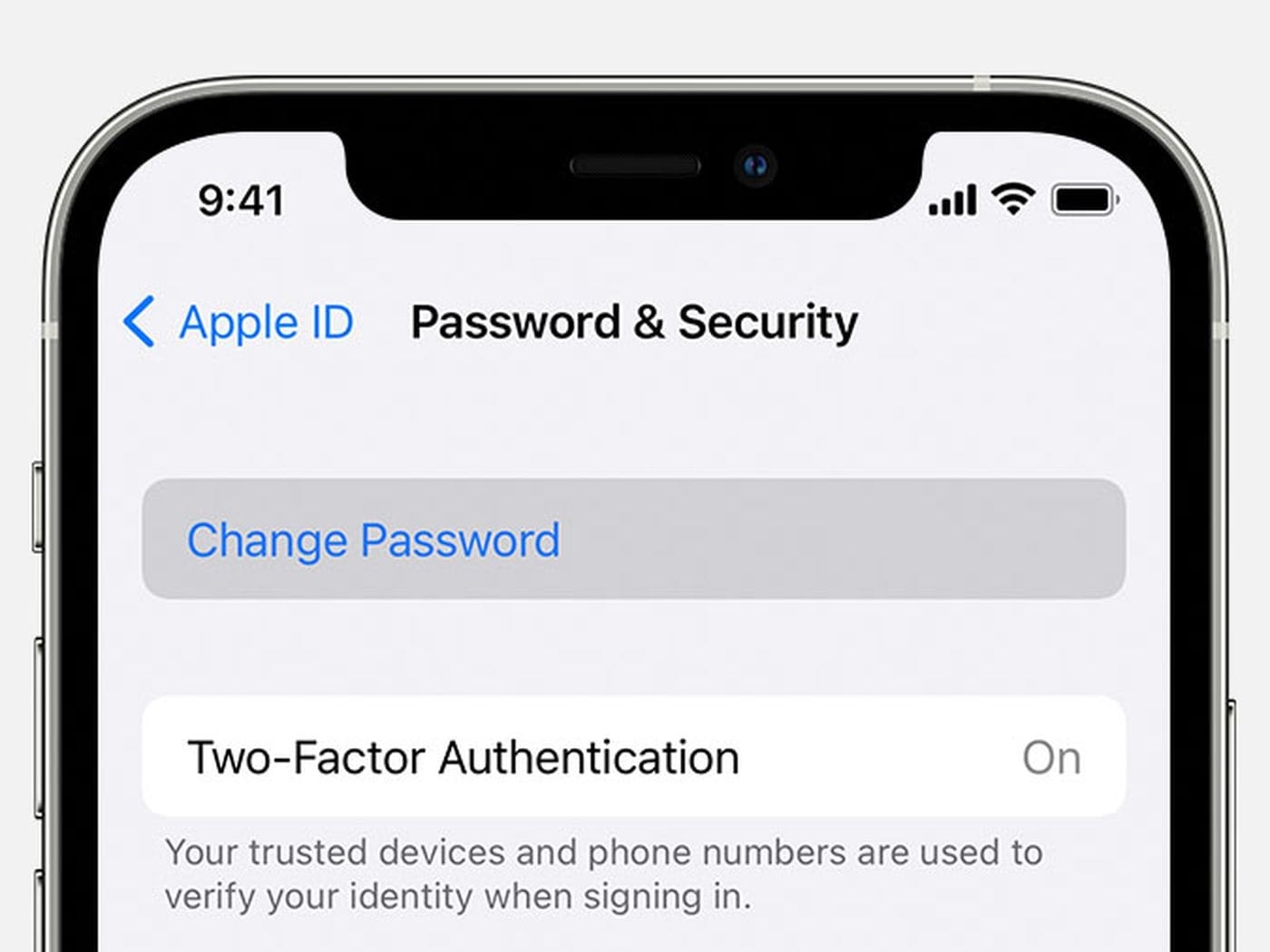
- Step 2: Enter your device passcode and follow the prompts to create a new password. Make sure it’s unique and secure to prevent future lockouts.
Email Verification
If you’ve forgotten your Apple ID password, you can initiate a password reset via email. Here’s how to do it on iPhone/iPad or Mac.
- On iPhone or iPad: On the Apple ID login screen, choose **Forgot password or don’t have an Apple ID?**Next, select Email authentication. You’ll receive an email with instructions to reset your password.
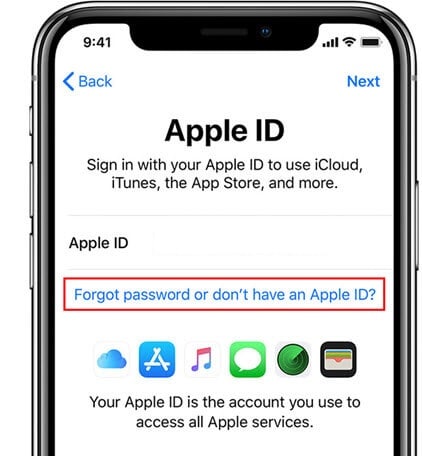
- On Mac: Choose the Applemenu and click System Settings. Click Sign in with your Apple ID > Forgot Apple ID or password? and follow the onscreen instructions.
While these methods should help you unlock your Apple ID, remember to keep your account secure to avoid future issues. If your issue persists after troubleshooting, then you may need an alternative solution. Dr.Fone - Screen Unlock, a trusted third-party solution, can resolve most Apple ID problems.
Part III. Unlock Your Apple ID With a Faster and More Flexible Solution
Unlocking your Apple ID is crucial to maintain your data. When traditional methods fail, Wondershare Dr.Fone - Screen Unlock offers a faster and more flexible solution. This reliable tool fixes most Apple ID issues with several benefits to boot.

Key Features
- Unlock Apple ID without a password. Fone Screen Unlock can unlock your Apple ID without requiring your password. The tool can be a lifesaver when all else seems to have failed.
- **Remove all types of screen locks.**Whether it’s a forgotten passcode, Touch, or Face ID, Dr.Fone can also remove all types of lock screens.
- **Compatible with the latest iOS.**Fone Screen Unlock is updated to stay compatible with the latest iOS and Apple devices. It ensures you can rely on it, regardless of your device’s model or software version.
In situations where traditional methods don’t work, Dr.Fone provides a solution to regain access to your Apple ID.
How To Unlock Disabled Apple ID Using Dr.Fone in 3 Steps
Unlocking a disabled Apple ID using Dr.Fone - Screen Unlock is straightforward. You can accomplish it by following three simple steps. Here’s how.
Step 1: Download Dr.Fone - Screen Unlock on your computer. Install the application and launch the software. Afterwards, select Screen Unlock from the main interface.
Step 2: In the next window, click Remove AppleID. Connect your Apple iPhone 14 to the computer using a USB cord and tap Trust on your Apple iPhone 14.

- Step 3: Follow the onscreen instructions, and let Dr.Fone - Screen Unlock process. It will unlock your disabled Apple ID without needing a password in minutes. When the process is complete, a notification on your screen will indicate that the Apple iPhone 14 device has been unlocked.
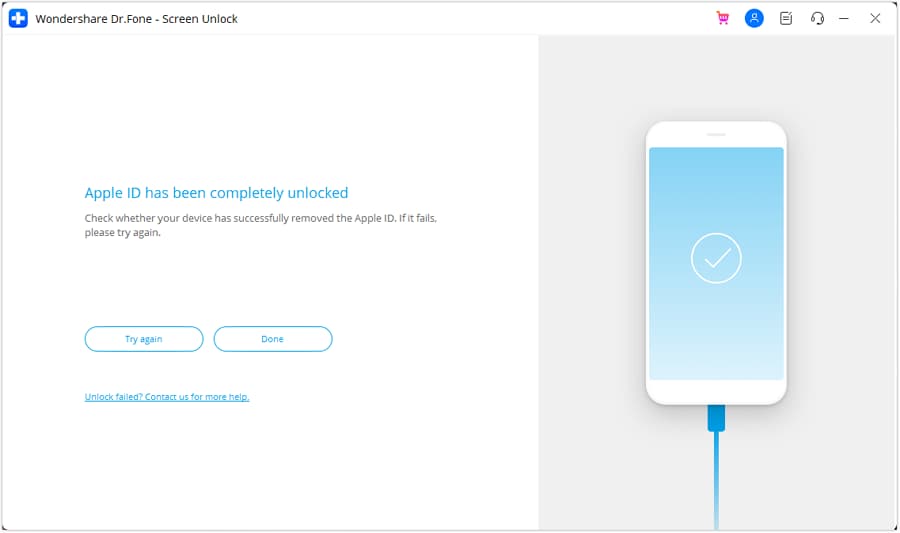
Bonus: Tips To Prevent Future Apple ID Lockouts
Preventing future Apple IDs from getting locked is essential to maintain access to Apple’s ecosystem. Here are some key tips to help you secure your account and avoid potential issues:

Use Strong Security Practices
Enable two-factor authentication for an extra layer of security. Use a complex and unique password. Use a mix of upper and lower-case letters, numbers, and symbols. Avoid using guessable information, like birthdays or common words.
Update Your Apple ID Information
Keep your contact information, recovery email, and security questions up to date. This ensures you can regain access if you forget your password or face account-related issues.
Check Your Account for Unusual Activities
Review your recent account activity. Look for unfamiliar devices or locations accessing your Apple ID. If you spot any suspicious actions, change your password and take necessary security measures.
Stay Informed About Apple’s Policies
Familiarize yourself with Apple’s terms of service and policies to avoid violating them. It will help prevent account disablement due to policy breaches.
Keep Your Payment Information Current
Ensure that your payment methods are up to date. Avoid any payment-related issues that might lead to your Apple ID being disabled.
Beware of Phishing Attempts
Be cautious of unsolicited emails, messages, or websites that request your Apple ID credentials. Always verify the authenticity of communication from Apple.
Secure Your Devices
Use a passcode, Touch ID, or Face ID to protect your Apple devices. It adds an extra layer of security to your account.
Conclusion
Safeguarding your Apple ID is important in maintaining access to Apple’s services. Knowing the common reasons for having an Apple ID locked situation is essential. By implementing strong security practices, you can prevent future lockouts. You should also monitor your account for unusual activities as an added measure.
However, consider using reliable third-party tools like Dr.Fone if all else fails. The platform works as a last resort or as a trusted companion to easily unlock your Apple ID. Prioritize your Apple ID’s security to enjoy the full benefits of the Apple ecosystem.
How To Remove the Two Factor Authentication On Apple iPhone 14
Want To Remove the Two Factor Authentication? Check Out This Guide
Continuous technology innovation has introduced many advanced encryption and security methods to protect data from hackers. With these innovations, companies like Apple and Google have introduced the two-factor authentication process to protect user data.
But sometimes, this security method becomes a hassle to access your data daily, due to which many users try to remove it. That is why, in this article, we have discussed how you can remove iCloud two-factor authentication easily.
- Part 1: What Is Two-Factor Authentication and How Helpful It Is
- Part 2: Can You Remove the Two Factor Authentication iCloud at Anytime
- Part 3: How To Remove the Two-Factor Authentication Within 14 Days
- Part 4: iPhone Apple ID Got Locked? Here’s a Reliable Tool To Get It Unlocked Without Passcode

Part 1: What Is Two-Factor Authentication and How Helpful It Is
Protecting users’ devices and online accounts is one of the major responsibilities of tech companies like Apple. Due to this, they have added multiple security features, including two-factor authentication. Thus, if you create an Apple ID, you can see a two-factor authentication option that adds an extra layer of security.
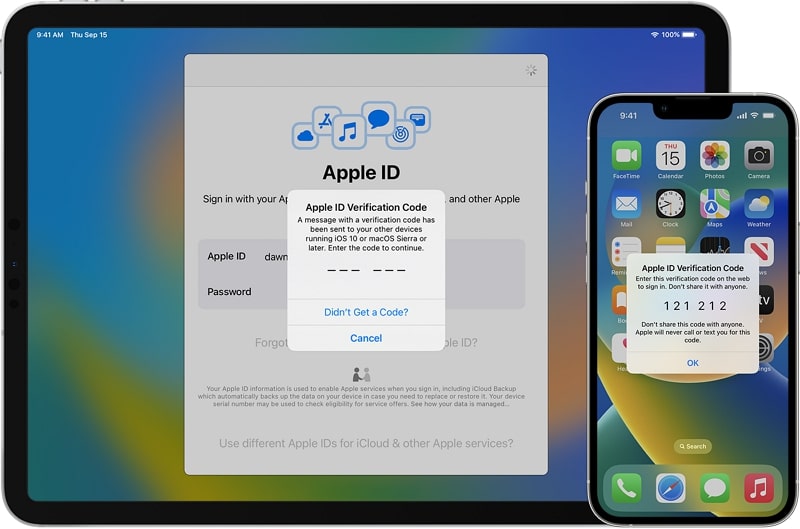
2FA is activated when the user provides the password to log into the Apple ID or software through a new device, and it acts as a second layer for account security. Apple ID or any software containing sensitive data cannot be accessed without it. This method provides a higher security level than single-factor authentication. To understand more benefits of this security system in detail, check the following points:
- Protection From Password Theft: 2FA acts as an additional security level. It protects your accounts and devices in case your password is leaked.
- Migrations of Unauthorized Assets: Online banking applications use 2FA to protect users from unauthorized bank transfers. If someone accesses their app, this is a beneficial security measure.
- Protection on Multiple Services: Platforms, including social media, banks, and cloud storage, use 2FA. It means that 2FA can be used in various digital aspects.
Part 2: Can You Remove the Two Factor Authentication iCloud at Anytime
Many people use 2FA globally to protect their personal information and devices from hackers and unauthorized access. However, in some cases, users may want to remove two-factor authentication iCloud for multiple reasons. This includes scenarios in which their device is lost or damaged or if they have found a better security option than this one.
Moreover, there is one important key point to note: Apple has removed the feature of deactivating 2FA from the Apple ID. It means you need to think twice before activating this feature on your Apple ID because it cannot be reversed. For the following reasons, Apple has taken this initiative:
- Enhanced Security: By removing the deactivation option for 2FA, Apple is trying to strengthen its account security to ensure that no one can access its user’s data.
- Reducing Vulnerabilities: Allowing users to deactivate 2FA could cause vulnerabilities in the Apple ecosystem that can be a weak point for protecting users’ data. That is why Apple has removed the deactivation option to stop malicious actors from taking advantage of this vulnerability.
- Encouraging Security Awareness: To make Apple users more security conscious, Apple has made it difficult on purpose to remove 2FA. It helps users to be more confident in Apple services and products.
- Minimizing Mistakenly Steps: If users mistakenly remove the 2FA, their accounts and devices are at risk of being accessed without proper authentication. To avoid such an issue, the deactivation option of 2FA is removed.
Besides all these reasons, there is still some good news for those who want to remove the two-factor authentication iPhone to use other security options. The good news is that Apple allows users to remove 2FA for a limited time after activation.
Part 3: How To Remove the Two-Factor Authentication Within 14 Days
As explained in the last part, Apple has made removing the 2FA option from Apple ID challenging for several security reasons. Thus, if you want to remove 2FA from your Apple ID, you have only 14 days after activating this feature. To understand how to disable iCloud two-factor authentication within this given time, check the following steps:
- Step 1. Once you have activated the 2FA feature, your 14-day grace period will start eventually. To deactivate this, open the enrollment email you received from Apple regarding 2FA on your Apple ID.
- Step 2. Scroll to the bottom of this email and select the link or button to return to your account security & settings section. There, follow the on-screen instructions to deactivate the 2FA of your Apple ID.
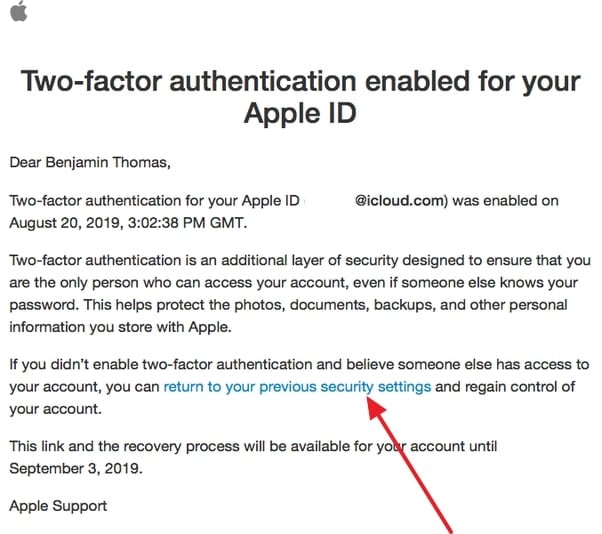
Part 4: iPhone Apple ID Got Locked? Here’s a Reliable Tool To Get It Unlocked Without Passcode
If you mistakenly got your Apple ID locked due to entering the wrong password multiple times, there is no need to stress it out. It is a common issue that many people forget their Apple ID password and cannot access it. Due to this, we have got you a perfect solution to unlock your Apple ID without a passcode.
This solution is the Wondershare Dr.Fone - Screen Unlock (iOS) tool specially designed to help users remove their iPhone and iPod lock screens. It is compatible with the latest iOS devices and assists in removing various types of lock screens, including Touch ID and Face ID.
Key Features
- This iOS screen unlock tool assists users in bypassing MDM without data loss and other technical errors.
- iCloud activation lock and iTunes backup encryption can be bypassed without a password in just a few steps.
- iPhone 15 and the latest versions of iOS 17/iPadOS 17 are supported by this tool to help users professionally.
Simplified Steps for Unlocking Apple ID With Wondershare Dr.Fone
To help you use this AI-powered screen unlock tool for unlocking the Apple ID without a password, follow the process we have mentioned below for your ease:
- Step 1. Access the Toolbox and Choose the Respective Option
Initiate the process by accessing Wondershare Dr.Fone’s latest version on your computer and tapping on the “Toolbox” option from its left side toolbar. Following this, choose “Screen Unlock” from the list of tools and tap “Remove Apple ID” in the next window.

- Step 2. Make Sure That the Apple iPhone 14 Is Connected to the Computer
Then, connect your Apple iPhone 14 to your computer using a USB cable so that you can see its connectivity status. Once the status is displayed on a new window, hit the “Unlock Now” button to proceed. Answer some questions that are asked by the platform, and with this, ensure that your device’s “Screen Lock” and “Two-Factor Authentication” are enabled or disabled.
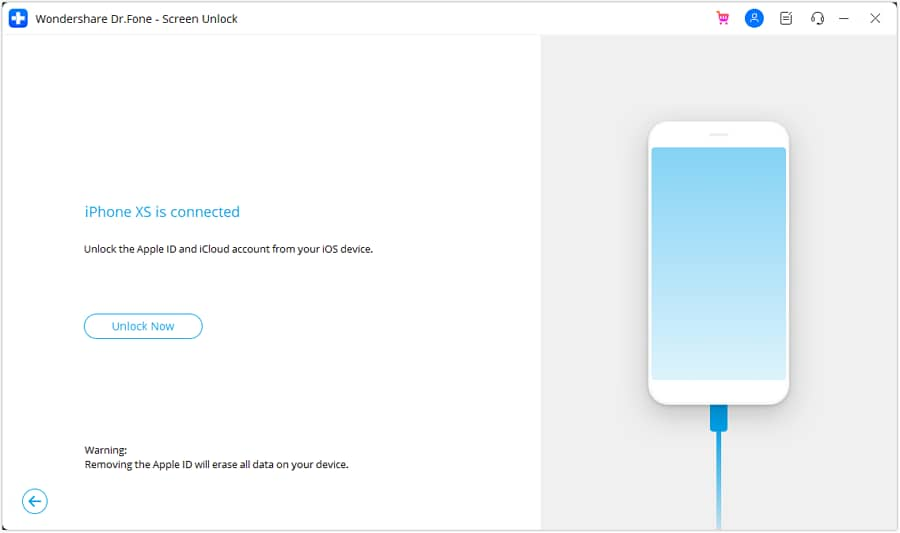
- Step 3. Select the System Version and Proceed Ahead
In this step, enable Recovery Mode by following the on-screen instructions. It will help the platform detect the connected device model, with which you will need to select “System Version.” Afterward, you can hit the “Start” button to proceed ahead.
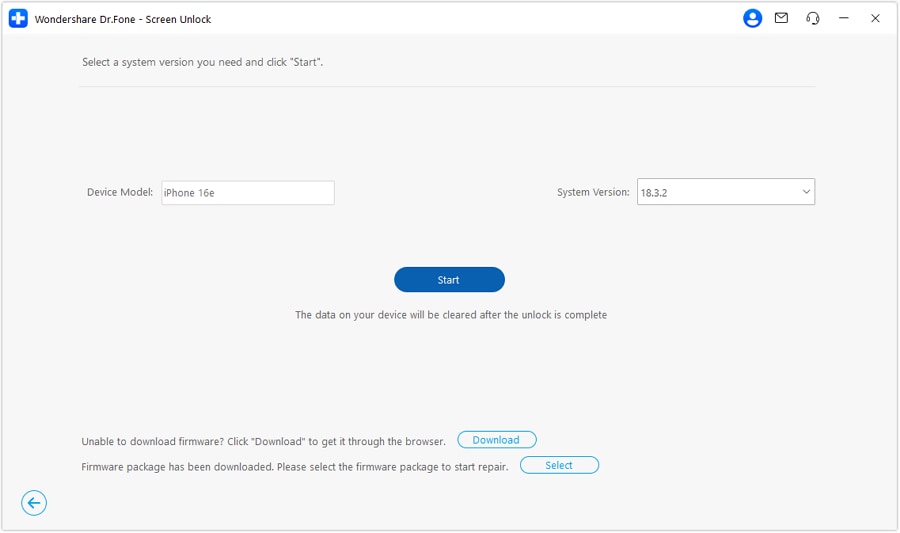
- Step 4. Start the Apple ID Unlocking Process
The respective iOS firmware will download according to the Apple iPhone 14 device model and system version. After it is downloaded, the platform will verify it for you, based on which you can tap the “Unlock Now” option to get your Apple ID unlocked successfully.
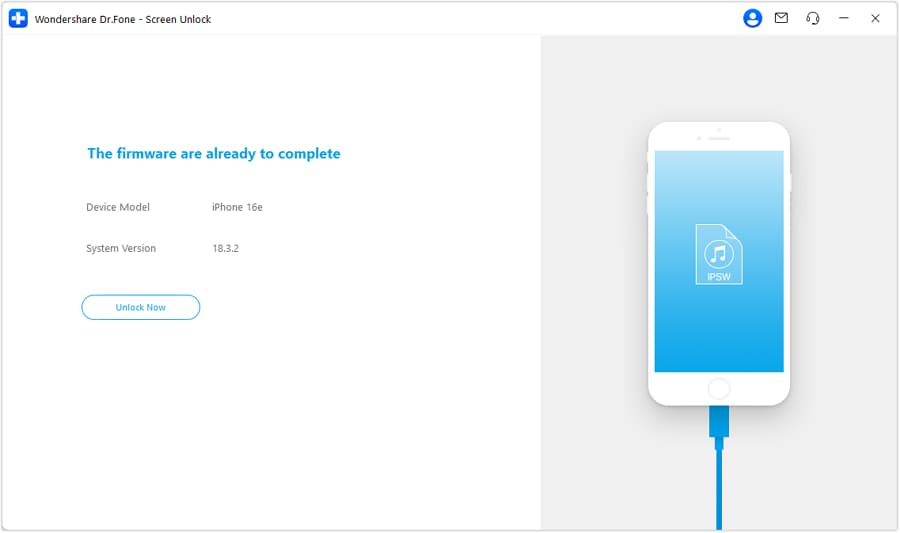
Conclusion
With this, we hope you understand how to disable iCloud two-factor authentication. However, remember that doing this is only possible within 14 days of a grace period. If this period is over, you cannot remove 2FA from your Apple ID.
Moreover, if you have locked your Apple ID passcode, using Wondershare Dr.Fone to unlock it can be the perfect option. While using this tool, you also don’t have to worry about screen locks on different iOS devices. This is because the innovative algorithms integrated in this tool make it easier to use for unlocking the Apple ID or screen lock.
Also read:
- [Updated] VimeoifyTweets Audio/Video Tweet Tool
- 2024 Approved Social Media Showdown Twitter's #TopTikTok Selection
- Apple ID Locked or Disabled On Apple iPhone 6s Plus? 7 Mehtods You Cant-Miss
- Get Chatty with These 17 Streetwise Spanish Terms
- In 2024, Apple ID Locked or Disabled From Apple iPhone 11 Pro? 7 Mehtods You Cant-Miss
- In 2024, How to Fix Locked Apple ID from Apple iPhone 7 Plus
- In 2024, Top 5 Car Locator Apps for ZTE Axon 40 Lite | Dr.fone
- MP4とAVCHDフォーマットの容易かつ鮮明な互換可能化手法解説!
- Ride Innovatively – Pioneering Helmet Cams for the Adventurous Rider, '23 Edition
- Starting Off Smoothly with Fast-Forwarding in Snapchat
- The Ultimate Guide to Choosing a CumulusPRO Restful Office Desk Mat for Healthier Standing Postures
- Why Apple Account Disabled From your iPhone 15? How to Fix
- Title: iCloud Separation How To Disconnect iPhone 14 and iPad
- Author: Alma
- Created at : 2024-10-17 16:25:29
- Updated at : 2024-10-20 19:28:20
- Link: https://apple-account.techidaily.com/icloud-separation-how-to-disconnect-iphone-14-and-ipad-by-drfone-ios/
- License: This work is licensed under CC BY-NC-SA 4.0.
